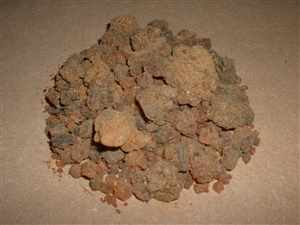Myrrh (Commiphora myrrha)
Main Facts about Myrrh

Using Myrrh
Myrrh is used as a fragrance in cosmetics and as a flavoring agent in foods and beverages. In pharmacy, myrrh is used as an antiseptic in mouthwashes, gargles, and toothpastes for prevention and treatment of gum disease. It helps relieve toothache, gingivitis, and mouth ulcers, and also freshens your breath. Use it as a mouthwash to help eliminate dental infections. Myrrh oil's benefits can be attributed to its powerful antioxidant, antifungal, antiviral, anti-inflammatory, anti-parasitic, expectorant, and antispasmodic properties. 1. Anti-inflammatory – provides relief from inflammation of tissues caused by infections, protects wounds from infections and make them heal quickly. Put it in a cold compress to relieve sores and wounds. Add it to creams and lotions to help relieve skin infections, such as athlete’s foot, ring worm, weeping eczema, bedsores, boils, carbuncles, and acne. 2. Antiseptic, antimicrobial and antiviral – protects from microbial infections such as fever and food poisoning. Myrrh essential oil is good against coughs and colds. It fights the viral infections that can cause coughs and colds, as well as relieves congestion, breathing trouble, heaviness in chest, and dry cough. It acts as expectorant and relieves you of excess mucus and phlegm. 3. Immune system booster. As a tonic, myrrh oil strengthens and activates your immune system to keep your body protected from infections and premature aging. 4. Digestive ailments – It promotes digestive health and helps cure problems like stomach upset, diarrhea, dyspepsia, indigestion, flatulence and hemorrhoids. 5. This oil takes care of uterine health and stimulates that organ. It is also an emmenagogue which means that it normalizes menstruation and relieves the associated symptoms like mood swings and hormonal imbalances. : It also provides relief from unwanted contractions or spasms and therefore eases cramps, aches, and muscle pain. 6. Myrrh has a rich, smoky, balsamic aroma that is purifying, restorative, revitalizing, and uplifting. This oil is highly valued in aromatherapy as a sedative, antidepressant and as a promoter of spiritual feelings. It has one of the highest levels of sesquiterpenes available. Sesquiterpenes are a class of compounds that have a direct effect on the hypothalamus, pituitary, and amygdala, the seat of our emotions. Myrrh is commonly used in aromatherapy for massages. It can also be added to a warm bath or applied directly to the skin for relaxation. 7. Skin care. Maintaining healthy skin is one of myrrh oil's renowned uses, as it prevents the signs of aging and soothes cracked or chapped skin. This is why it's commonly added to many skin care products today. You can also blend myrrh oil with other ingredients. For example, consider making homemade frankincense and myrrh lotion to help heal and tone the skin. It blends well with citrus oil, such as bergamot, grapefruit, or lemon to help lighten up its fragrance.Myrrh is a remedy for: Cold and flu
Caution!
Do not take if pregnant or breast-feeding. Never use Myrrh oil undiluted. Myrrh may interact with warfarin and other coumarin derivatives. Myrrh has demonstrated the ability to lower blood sugar levels.Cooking with Myrrh
Myrrh may be administered as: 1) Tinctures - Paint or dab on the affected area(s) 2 to 3 times daily. Do not dilute the tincture. 2)Tea - 1 to 2 teaspoonfuls of resin per 1 cup of boiling water, steep for 10 to 15 minutes and drink 3 times daily. 3)Rinses - 5 to 10 drops in a glass of water. 4) Gargles - 30 to 60 drops in a glass of water. 5) Dental powders.| Mullein |
Nettle
|